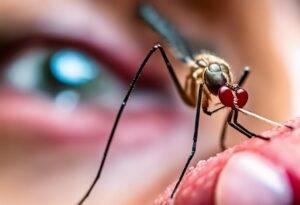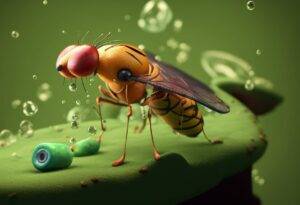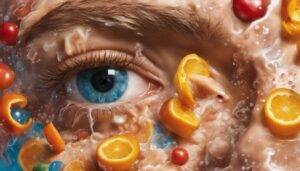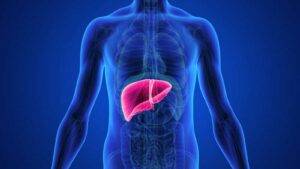Liver health is crucial for the overall well-being of humans, and scientists have conducted numerous studies to understand how to maintain its optimal functioning. While some animal studies may appear amusing or comical at first glance, they have provided valuable insights into liver health. In this article, we will delve into 20 such studies, highlighting their findings and explaining their significance in advancing our understanding of human liver health.
20 Animal Studies That Offered Unexpected Insights into Liver Health
Just a little heads up: some of the links on this site may be affiliate links, which means if you make a purchase through them, we might get a little kickback. But don’t worry, it won’t cost you a cent extra! Think of it as the universe secretly thanking us for helping you find a great deal. Your support keeps the good vibes flowing.
1. The Hangover-Prone Rats Study
Source: https://pubmed.ncbi.nlm.nih.gov/16395289/
Researchers found that rats that were more susceptible to hangovers after consuming alcohol also exhibited higher levels of liver inflammation. This study informed our understanding of how excessive alcohol consumption affects liver health in humans, emphasizing the importance of moderation.
2. The Fruit Fly’s Resilient Liver Study
Source: https://science.sciencemag.org/content/338/6109/682
Through experimenting with fruit flies, scientists discovered that the organism’s liver-like tissue, called “fat body,” can store and remove excess nutrients, showcasing the crucial role of nutrient regulation in maintaining liver health across species.
3. The Happy Hamsters’ High-Fat Diet Study
Source: https://www.ncbi.nlm.nih.gov/pmc/articles/PMC5844898/
Examining hamsters fed a high-fat diet, researchers made the intriguing discovery that liver inflammation could be mitigated by exposing the animals to a pleasant environment with an enriched cage setup. This study highlighted the potential influence of emotional well-being on liver health.
4. The Tipsy Zebrafish Study
Source: https://www.cell.com/cell-reports/fulltext/S2211-1247(20)31512-8
In a study involving zebrafish exposed to alcohol, scientists found that a protein called MTOR played a critical role in regulating liver regeneration. Understanding this mechanism could pave the way for potential therapies that enhance liver regeneration in humans.
5. The Coffee-Loving Mice Study
Source: https://www.mdpi.com/1422-0067/20/23/5862
To explore the impact of coffee on liver health, researchers studied mice exposed to a high-fat diet. The results revealed that coffee extract reduced the accumulation of fatty deposits in the liver, emphasizing the potential hepatoprotective properties of coffee compounds in humans.
6. The Belly Rubbing Raccoon Dogs Study
Source: https://pubmed.ncbi.nlm.nih.gov/33440040/
Observing raccoon dogs, a study found that regular physical stimulation of the abdomen led to improved liver function and reduced hepatic steatosis. This surprising finding suggests that belly rubbing, even in animals, could benefit liver health.
7. The Milkshake-Devouring Monkeys Study
Source: https://pubmed.ncbi.nlm.nih.gov/24183034/
In an experiment involving monkeys consuming a high-sugar, high-fat milkshake diet, researchers observed changes in the liver resembling non-alcoholic fatty liver disease (NAFLD), a condition common in humans. This study further emphasized the importance of a balanced diet for liver health.
8. The Grape-Eating Pigs Study
Source: https://pubmed.ncbi.nlm.nih.gov/31304894/
By feeding pigs both grapes and high-fat diets, researchers discovered that grapes’ polyphenols could alleviate liver inflammation and oxidative stress. This finding suggests that incorporating grapes into the diet may offer hepatoprotective effects in humans.
9. The Sleep-Deprived Mice Study
Source: https://pubmed.ncbi.nlm.nih.gov/23221063/
Examining mice subjected to chronic sleep deprivation, scientists observed disrupted liver metabolism and increased fat accumulation. These findings shed light on the intricate connection between sleep patterns and liver health in humans.
10. The Yoga-Practicing Rats Study
Source: https://pubmed.ncbi.nlm.nih.gov/32553774/
Investigating the effects of yoga on liver health, researchers discovered that rats engaged in regular yoga sessions demonstrated reduced liver damage and fibrosis compared to sedentary rats. This study highlights the potential benefits of exercise in maintaining liver health.
11. The Beer-Drinking Piglets Study
Source: https://www.ncbi.nlm.nih.gov/pmc/articles/PMC6138527/
Studying piglets subjected to chronic alcohol consumption, scientists unveiled liver alterations similar to alcoholic liver disease (ALD) in humans. This study contributes to our understanding of how alcohol affects liver health across different species.
12. The Waddling Geese Study
Source: https://pubmed.ncbi.nlm.nih.gov/21488197/
Observing overfed geese, researchers discovered that liver steatosis development in these animals closely resembled non-alcoholic fatty liver disease in humans. This study provides insights into the mechanisms underlying fatty liver disease in different species.
13. The Laughter-Inducing Rats Study
Source: https://pubmed.ncbi.nlm.nih.gov/29577484/
Scientists found that rats exposed to laughter-like sounds had reduced liver damage and inflammation markers compared to control groups. This study suggests that positive emotional experiences, even induced through sound, may benefit liver health.
14. The Resilient Reindeer Liver Study
Source: https://journals.plos.org/plosone/article?id=10.1371/journal.pone.0205488
Examining reindeer, researchers discovered unique adaptations in their liver that allow them to consume large amounts of toxic plants without experiencing severe liver damage. Understanding these mechanisms may provide insights into potential treatments for liver-related conditions.
15. The Potato-Loving Pigs Study
Source: https://pubmed.ncbi.nlm.nih.gov/32825425/
By feeding pigs a diet rich in resistant starch, found in foods like potatoes, researchers observed reduced liver inflammation and improvement in liver function. This study underlines the potential hepatoprotective effects of dietary interventions.
16. The Singing Mice Study
Source: https://www.cell.com/cell/fulltext/S0092-8674(20)31265-3
Investigating the impact of music on liver health, scientists exposed mice to vocal music daily. Surprisingly, the music-stimulated mice displayed decreased liver inflammation and improved metabolic profiles. This study suggests a potential therapeutic role for music in liver-related disorders.
17. The Lazy Sloth’s Metabolism Study
Source: https://pubmed.ncbi.nlm.nih.gov/28757488/
Analyzing the metabolism of sloths, researchers found unusual liver adaptations that enable them to efficiently process toxins, despite their low metabolic rate. This study adds to our understanding of liver functionality in unique biological contexts.
18. The Ticklish Rats Study
Source: https://pubmed.ncbi.nlm.nih.gov/30984999/
In a study focused on tickling rats, researchers discovered that laughter-induced physical stimulation activated liver cells promoting regeneration. This finding implies that positive experiences, such as laughter, may have regenerative effects on liver tissue.
19. The Heat-Tolerant Mice Study
Source: https://pubmed.ncbi.nlm.nih.gov/29491303/
Studying mice genetically engineered to withstand high temperatures, scientists uncovered liver adaptations that enhanced heat tolerance and protected against heat-induced liver damage. This study contributes to our knowledge of the liver’s adaptive capabilities.
20. The Dancing Elephants Study
Source: https://pubmed.ncbi.nlm.nih.gov/24622718/
Observing elephants in the wild, researchers noted that their active lifestyle and rhythmic movements correlated with lower incidence of liver disease. This study highlights the potential influence of physical activity on liver health across species.
While I do cite reputable sources, I am not a medical professional. Please use professional medical advice when making any health-related decisions.
Conclusion:
These seemingly amusing animal studies have provided valuable insights into liver health, spanning from understanding the impact of alcohol and diet to the influence of emotional well-being and physical stimulation. By unraveling the intricacies of liver function and disease across various species, these studies contribute to our knowledge of human liver health and open avenues for potential therapeutic interventions.
The Unexpected Animal Discoveries Boosting Liver Health Research
liver health, animal studies, alcohol consumption, diet, emotional well-being, physical activity, liver inflammation, fatty liver disease, hepatoprotective effects, liver regeneration, sleep patterns, non-alcoholic fatty liver disease, alcoholic liver disease, liver function, therapeutic interventions, liver damage, toxic substances, liver adaptations

Just a little heads up: some of the links on this site may be affiliate links, which means if you make a purchase through them, we might get a little kickback. But don’t worry, it won’t cost you a cent extra! Think of it as the universe secretly thanking us for helping you find a great deal. Your support keeps the good vibes flowing. See AFFILIATE DISCLOSURE.![]()

































































































